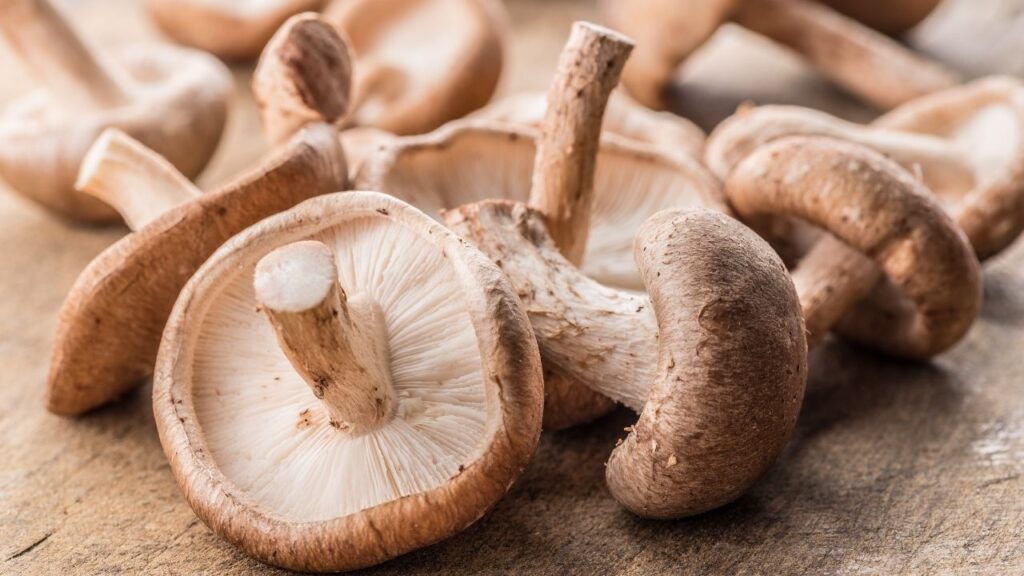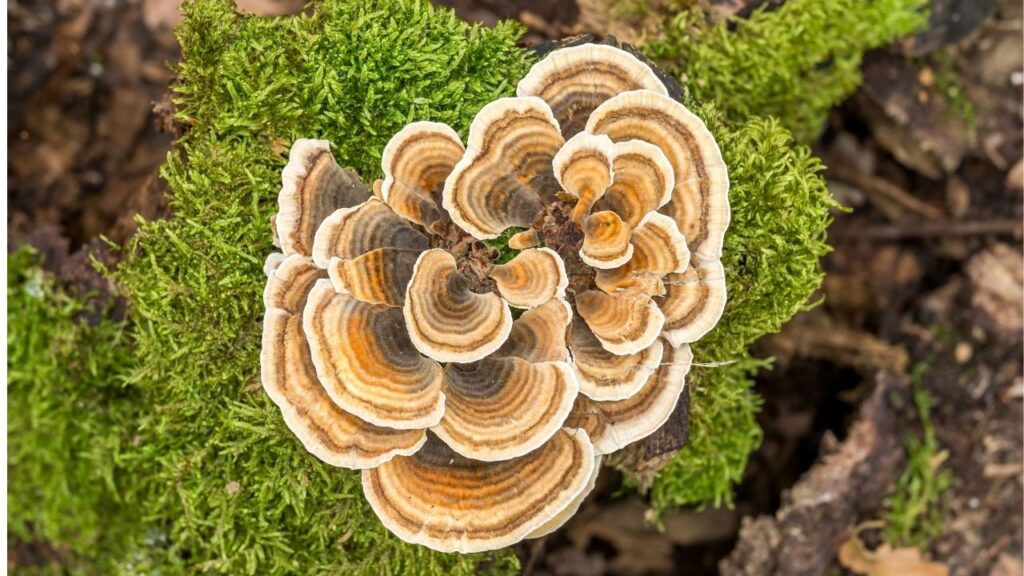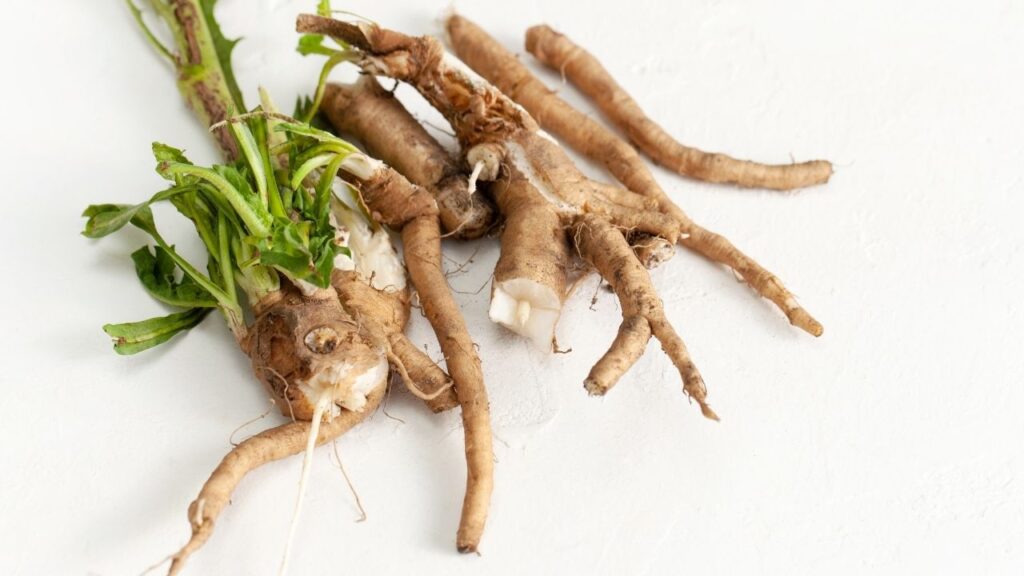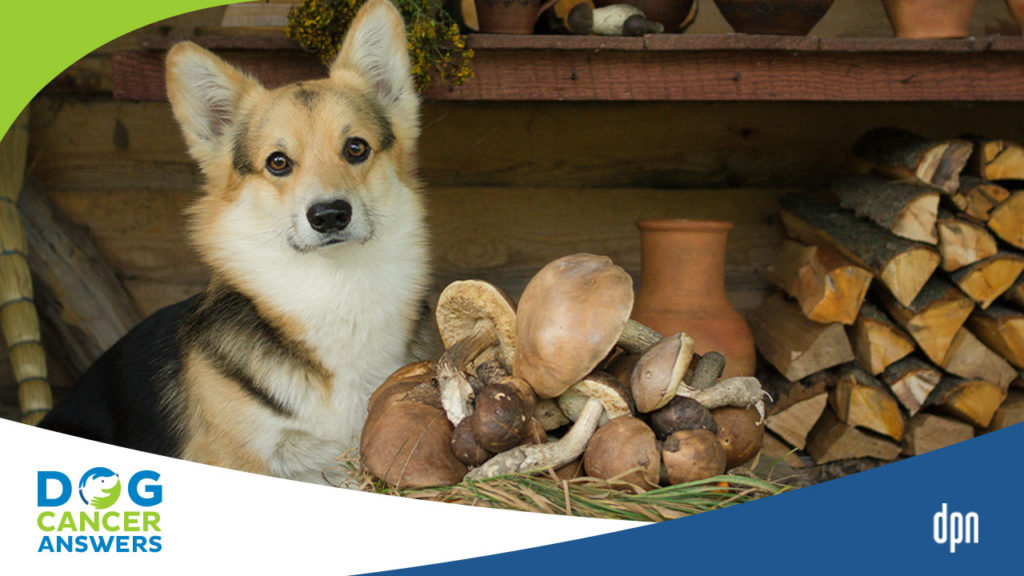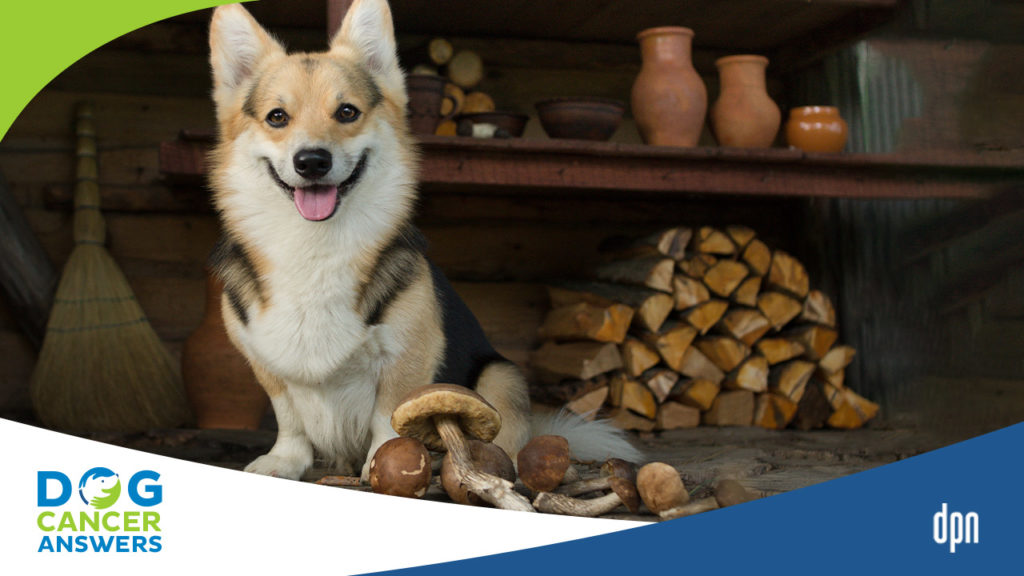Medicinal mushrooms have been used in human medicine for thousands of years. They can also offer health benefits for dogs. Medicinal mushrooms can deliver a boost to your dog’s immune system, help them cope with the side effects of conventional cancer treatments, and fight tumor growth.
Key Takeaways
- Medicinal mushrooms are safe for dogs and may incur health benefits.
- Mushrooms can lower blood pressure, support liver and kidney function, clear toxins from the body, help prevent heart disease by decreasing cholesterol and the likelihood of blood clots, boost the immune system, prevent and help fight cancer
- Reishi mushrooms help to boost the immune system and help relieve some allergies.
- Medicinal mushrooms are not generally known to have any negative side effects, but they may cause stomach upset if not given with food.
- It may be best to start with a blend of mushrooms if you are unsure which specific extract to give your dog.
- For better absorption cooking is recommended if you give your dog mushrooms as food.
What Are Medicinal Mushrooms?
Medicinal mushrooms have been used for thousands of years to prevent and treat numerous diseases as well as to optimize general health.1 Medicinal mushrooms include varieties you can find in most grocery stores today. They can deliver a boost to your dog’s immune system, help them cope with the side effects of conventional cancer treatments, and fight tumor growth.
The Core Components of Mushrooms
Mushrooms contain:
- Polysaccharides (sugar molecules bonded together)
- Proteins
- Glycoproteins (proteins with a carbohydrate molecule attached to them).
Glycoproteins are credited to have anticancer, anti-inflammatory, and immune boosting properties.1
Mushrooms Have a Long History in Medicine.
Medicinal mushrooms have been used for thousands of years, but they didn’t gain momentum in western medicine until the early 1990s, when doctors noted that mushroom extracts had wide ranging benefits to the body.2
Dr. Demian Dressler explains his top picks for supplements for dogs with cancer, including why medicinal mushrooms make the list, in this episode of DOG CANCER ANSWERS.
Benefits of Medicinal Mushrooms for Dogs
Medicinal mushrooms for dogs are known to stimulate immunity and help with the toxic side effects of chemotherapy and radiation.3
Medicinal mushrooms can offer many health benefits:
- Lower blood pressure
- Support liver and kidney function
- Clear toxins from the body
- Prevent heart disease
- Boost the immune system
- Reduce allergic reactions
- Prevent and help fight cancer
There are many medicinal mushrooms on the market. Here are a few that are known to assist with cancer prevention or treatment.
Reishi (Canoderma lingzhi)
Reishi has over 400 bioactive compounds and is often prescribed for cancer prevention as well as an adjunct to chemotherapy or radiotherapy.4
The polysaccharides in reishi provide anti-tumor support by activating white blood cells (lymphocytes) in the immune system.
Maitake (Grifola frondosa)
This medicinal mushroom is heavily used in Traditional Chinese Medicine. It’s thought to bring vigor to the body. It’s commonly used for cancer treatment and cancer prevention.4
Shiitake (Lentinula edodes)
This is one of the most widely used medicinal mushrooms. You’re likely familiar with shiitake because of its use in cooking. It produces beta-glucan lentinan, which is responsible for some of the mushroom’s anticancer activity. It also works to strengthen the immune system.4
You can read our longer article about shiitake here.
Turkey tail (Coriolus versicolor)
Turkey tail is considered highly effective at fighting cancer. It’s one of the most studied medicinal mushrooms because it contains PSP and PSK. PSP and PSK have immune boosting and tumor fighting effects.2,1 “’Im-Yunity” is a popular brand whose efficacy has been demonstrated in at least one study.2
You can read our longer article about turkey tail mushrooms here.
Chaga (Inontus obliquus)
This mushroom is difficult to find in the wild and is prized by those who do. It’s high in antioxidants and is reported to slow down cancer growth.5
Agaricus (Agaricus blazei)
This medicinal mushroom is native to Brazil but is widely cultivated in Japan. It’s thought to have both antitumor and immune stimulating properties. This mushroom produces a mycotoxin that induces tumors and seizures in mice,6,7,8 so use with caution. Some veterinarians describe it as safe to give your dog.3 Others warn of severe gastrointestinal upset.9
Dr. Robert Silver discusses specific mushrooms that can help dogs with cancer, including chaga, cordyceps, lion’s mane, maitake, reishi, shiitake, and turkey tail in this DOG CANCER ANSWERS episode.
Mushroom “Formulas” Are Also an Option
Many supplement companies blend different medicinal mushrooms together to give more wide-ranging benefits.
Concentration is Important
To be effective for your dog, the product must contain high-quality medicinal mushroom extract. Many products have false claims on their labels, promising “miracle cures” that are heavily diluted bottles of mushroom in a liquid solution or tablet full of filler.4 Only purchase from reputable companies who can prove their ingredients.
The Power of Beta-Glucans
Beta-glucans (β-glucan) are a type of glucose molecules linked together, contained in the cell walls of the mushroom. They are one reason medicinal mushrooms are so powerful. These soluble fibers stimulate your dog’s lymphocytes (white blood cells) to help fight disease.3
Individual medicinal mushrooms may have other extra potent properties. It’s best to talk with your veterinarian about your dog’s needs. This will help you determine what medicinal mushrooms are right for them.
Scientific Studies Have Demonstrated Their Power in Certain Cancers
In one promising study, 15 dogs diagnosed with hemangiosarcoma were given the I’m-Yunity turkey tail supplement – a specific product on the market today. Overall, the dogs given the higher dose of I’m-Yunity had the longest recorded survival times.2
In the same study, dogs who took the I’m-Yunity turkey tail supplement post-surgery lived a median survival time of 199 days without chemotherapy. These promising results suggest components in turkey tail may deliver meaningful antitumor and survival effects. Larger, longer-term studies are needed to prove this is true.2
Another study that applied a bioactive extract from maitake mushroom – called D-fraction – found it inhibited the growth of cells belonging to specific mammary, connective tissue, and lymphoma cancer cell lines.10 Results were promising. They showed the D-fraction extract killed some cancer cells and inhibited others.
Some follow-up studies are not as promising. Clearly, more research is needed.
Use for Osteosarcoma
Medicinal mushrooms could also potentially benefit dogs with osteosarcoma.
Research out of Aloha Medicinals – spearheaded by Dr. John Holliday – showed that their supplement K-9 Immunity paired with their boosting supplement Transfer Factor worked especially well for dogs with osteosarcoma.11
End of Life Care and Quality of Life
Mushrooms have many benefits that help maintain quality of life to dogs who are nearing the end of their journey with cancer.2 Medicinal mushrooms may improve your dog’s comfort, improve energy level, decrease infections, and decrease cognitive decline during this time.
Safety and Side Effects
Not all mushrooms are medicinal. Some are toxic and deadly.1
Do not feed wild forage mushrooms to your dog unless you are an expert in mushroom identification.
Mushrooms from the wild may be fresher and from more “organic” sources, but that does not necessarily mean they are safe. They also may be contaminated with toxic metals such as arsenic, lead, cadmium, and mercury.8 They can even be radioactive due to the ability of mushrooms to accumulate isotopes resulting from nuclear reactors and weapons.8
Medicinal mushrooms are also not heavily regulated by the FDA in the United States. This means they can be sold without the manufacturer having to demonstrate their usefulness or safety, and without a guarantee that the ingredients contained in the product are consistent or accurately reported.1 Because of this, you should only buy from reputable qualified sources.4
Side effects that your dog may experience depend on the type of mushroom, but may include:1
- Upset stomach
- Diarrhea
- Dizziness
- Skin rash
More severe toxicity symptoms may include:1
- Seizures
- Severe vomiting or diarrhea
- Increased water intake
- Lack of appetite
- Yellowing of the skin or eyes
- Lethargy
Call your veterinarian or an emergency veterinarian if your dog is showing signs of a possible reaction.1 You can also call the Pet Poison Helpline. They are available 24/7 (https://www.petpoisonhelpline.com/).9
Always Consult with Your Vet First
It’s very important that you work with your veterinarian when adding medicinal mushrooms to your dog’s treatment plan.
Your vet will likely want to keep a careful eye on your dog’s use of and response to medicinal mushrooms since prolonged use of high doses may cause them harm.1 Your vet will also be able to tell you about any potential interactions with vitamins, herbal therapies, supplements, and medications.1
Your vet may consult a holistic veterinarian or veterinarian oncologist that practices integrative veterinary medicine if they are unfamiliar with mushrooms.
What Can Medicinal Mushrooms Be Taken With?
Different medicinal mushrooms can be taken together and are often sold in blends.
For example, reishi and shiitake are thought to have synergistic effects that make them more effective when combined.5
Medicinal mushrooms can be used with some kinds of chemotherapy. They may be helpful for combatting the negative effects of chemotherapeutic drugs. (But always follow your veterinary oncologist’s suggestions for use in your own dog’s case.)
- One study found that a mushroom extract blend reduced the side effects experienced by dogs who became neutropenic (having an abnormally low number of neutrophils, a type of white blood cell) during chemotherapy.12
- Medicinal mushrooms may also relieve other symptoms. Owners have reported that it increased the overall quality of their dog’s life.12
- However, timing between the use of chemotherapy and mushrooms is important (more on that below).
When to Not Use
Medicinal mushrooms should be used with caution in dogs that have the any of the following:
- bleeding disorders
- low blood pressure
- liver or kidney disease
- immune mediated disorders1
- are pregnant or nursing1
- are taking insulin or other diabetes medications, anti-inflammatories, anti-coagulants, or immune modulators1
Time It Right with Chemotherapy!
One of the main purposes of chemotherapy and radiation is to introduce free radicals into your dog’s body that will kill their cancer cells. Antioxidants snatch up these free radicals before they have a chance to do their job.
Medicinal mushrooms can have an antioxidant effect, which may actually interfere with chemo or radiation, and potentially make the treatment less effective.3
You’ll want to work out timing with your vet to ensure that your use of medicinal mushrooms that may help with side effects is not directly overlapping with chemotherapy or radiation.3
Dr. Robert Silver explains how mushrooms are harvested for supplements and how they can help your dog in this episode of DOG CANCER ANSWERS.
How to Give
Medicinal mushrooms are given in the form of capsules, powder, chewable tablets, or liquid extracts.1 This is to ensure that they can be delivered with a heavy concentration.4
Some would argue that not all delivery mechanisms are created equal.
Tablets tend to have binders and other ingredients to help hold them together. They may not dissolve as easily in the stomach and have extra ingredients that aren’t beneficial.4
Liquid extracts are possibly more effective, depending on how they are made. They can be more powerful, require only a few drops in smaller dogs, and can be easily mixed in with food. Liquid extracts may be more easily digestible than other forms.4
Powder supplements may be easy to mix into food and are quite palatable.
You can opt for a tonic blend of mushrooms. This may help you get your dog the broadest range of health benefits. You can then alter it with the help of your veterinarian depending on what needs arise.4
If you do give your dog an entire whole mushroom, be sure it is safe to eat, and be sure to cook it. Raw mushrooms are not absorbed well.4 Any mushrooms you buy in the grocery store to cook for yourself can be cooked for your dog.
In any form, mushrooms can be given with or without food. Give it with food to help ease your dog’s digestion if stomach upset occurs.1
What If I Miss a Dose?
Give the dose when you remember so long as it is not close to when you have to give the next dose.
It too much time has elapsed, then skip the dose until it’s time for the next one.
Never give your dog two doses at once, and don’t give any extra doses to make-up for the skipped one.
Storage and Handling
You should follow the specific storage instructions on your medicinal mushroom packaging.
Instructions will tell you to store the product in a cool and dry place away from sunlight.1
Medicinal mushrooms can lose their active compounds and “go bad” over time. Be sure to adhere to the Best By date and follow storage instructions.
Our Take
Medicinal mushrooms can be an important component of full spectrum care in treating your dog’s cancer. There are many on the market, and you can opt for one that is specific to your dog’s needs or try a blend.
It’s important to speak with your veterinarian, as they can both help you choose a product and ensure that its use doesn’t interfere with your dog’s current therapies.
We think medicinal mushrooms are worth a try given their demonstrated benefits, ease of use, and long history of helping treat disease.
- Gollakner R. Medicinal Mushrooms. VCA Animal Hospitals. No publication date available. Accessed December 1, 2022. https://vcahospitals.com/know-your-pet/medicinal-mushrooms.
- Brown DC, Reetz J. Single agent polysaccharopeptide delas metastases and improves survival in naturally occurring hemangiosarcoma. Evid Based Complement Alternat Medi 2012; 2012:384301.
- Dressler D. Fantastic fungus and dog cancer…medicinal mushrooms!? Dog Cancer Blog. April 13, 2021. Accessed December 1, 2022. https://www.dogcancerblog.com/articles/full-spectrum-cancer-care/supplements/fantastic-fungus-and-dog-cancermedicinal-mushrooms/.
- Cooke N. Medicinal mushrooms for dogs – which one and why? Canine Ceuticals. April 11, 2022. Accessed December 1, 2022. https://canineceuticals.com.au/blogs/news/medicinal-mushrooms-for-dogs.
- Scott D. 5 top mushrooms for dogs with cancer. Dogs Naturally. July 18, 2022. Accessed December 1, 2022. https://www.dogsnaturallymagazine.com/medicinal-mushrooms-for-cancer-in-dogs/.
- Toth B, Nagel D. Studies of the tumorigenic potential of 4-substituted phenylhydrazines by the subcutaneous route. J Toxicol Environ Health. 1981;8:1–9.
- Toth B, Raha CR, Wallcave L, Nagel D. Attempted tumor induction with agaritine in mice. Anticancer res. 1981;1:255–8.
- Firenzuoli F, Gori L. Lombardo G. The medicinal mushroom Agaricus blazei Murrill: Review of literature and pharmaco-toxicological problems. Evid Based Complement Alternat Med 2008;5(1):3-15.
- Hovda L. Unfriendly fungi: five types of mushrooms toxic to pets. Dvm360. October 20, 2015. Accessed December 2, 2022. https://www.dvm360.com/view/unfriendly-fungi-five-types-mushrooms-toxic-pets.
- Konna S. Potential growth inhibitory effect of maitake D-fraction on canine cancer cells. Vet Ther 2004;5(4):263-271. (https://pubmed.ncbi.nlm.nih.gov/15719326/)
- Dressler D, Ettinger S. The Dog Cancer Survival Guide. Maui Media, 2011
- Holliday JC, Gianotti BM, Cleaver MP, Mullins MN, West SY. Preclinical evaluation of concurrent medicinal mushroom-based immune-enhancement supplementation in dogs undergoing chemotherapy for various cancers. International J of Medicinal Mushrooms 2009;11(2):167-184.
Topics
Did You Find This Helpful? Share It with Your Pack!
Use the buttons to share what you learned on social media, download a PDF, print this out, or email it to your veterinarian.
